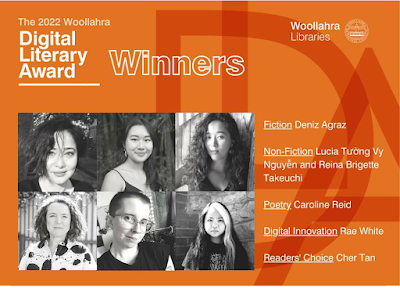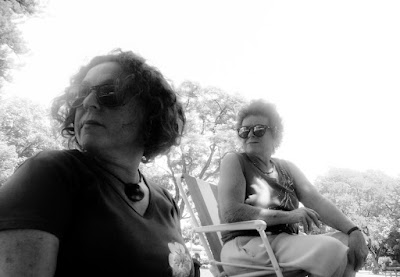Winner, Woollahra Digital Literary Award for Poetry
This year has been an extraordinary one. I decided to quit my part-time job and commit to writing full-time. It was a thrilling and scary decision, a long time in the making. Then, as if I needed reminding that life is short so I had better get on with it, my mother died on January 12th, while I was in hotel quarantine. Two days before my mother's funeral I got a phone call from the UK informing me that my poem 'A Poem To My Mother That She Will Never Read' had won the International Mslexia Award for Poetry. That was one of the most poetic moments of my life. Poetic because the poetry that resonates best with me always makes me feel more than one thing.
Being published online meant I was able to submit it to the Woollahra Digital Literary Award for Poetry in Australia. It was announced last night that it won that award.
I am humbled, grateful, proud, teary, sad, elated. Thanks to Woollahra Council & Libraries; Ocean Vuong for the title inspo; all the poets whose work has inspired me; my Ma; and Judge Ali Whitelock, who engaged with the poem in all the ways I hoped a reader would, and articulated it so brilliantly. So brilliantly and beautifully, in fact, rather than summarise I'm taking the liberty of reproducing her full report below.
You can read
the winners and shortlisted works in all the categories over at the
Woollahra website HERE.
Also, importantly, a big shout to all those living with dementia and chronic diseases, and their carers. As you can imagine, that's a lot of people. Dementia is being called the silent epidemic. There is currently 55 million people world-wide who have dementia. In Australia it's estimated that by 2031 600,000 people will be living with it. Globally, dementia has a disproportinate impact on women.
* *
JUDGE'S NOTES: WOOLLAHRA DIGITAL LITERARY AWARD (POETRY) 2022 by Ali Whitelock:
Caroline Reid may (or may not) be a shouty person. But let it be said, this poem screams off the screen and demands (in the most beautiful and heart-achingly urgent of ways) to be read. This is a wild, grief-fuelled ride through the landscape of two coexisting worlds (the world of dementia and the ‘other’ world); a poem where the poet straddles what feels like the unbridgeable distance where those closest to us are furthest away; where a daughter mistypes google searches and looks to algorithms for answers where there are none; where the poet, wet with crazy in my good daughter devotion keeps searching and trying to get a handle on something that has no handle. This poem, in all its heartbreaking, jaw dropping glory jumps from one idea to the next like an adult playing leapfrog in a swing park where they don’t want to play anymore. It is original and fresh and devastating in all its terrible beauty.
And look at how it looks on the page––how it brilliantly it sketches the erratic pathways of the poet’s mum’s deteriorating memory; how it meanders so messily, yet so beautifully. Look at how it seems to mirror dementia’s fucked up-ness, the sharp turns, the short / sometimes long lines, how it mimics the wildly oscillating grief of this daughter frantically watching on while her mother slips from her like a series of black and white photographs disappearing down the back of the couch and she has literally no way to save her.
And yet the poem itself is not erratic. It is wild, yet masterfully controlled. It sings and it jars and is terrifying and haunting and every line triple-summersaults through the air and lands so precisely that if this were the poetry olympics, each line would score a perfect ten from each of the judges.
And then there are lines like these––dazzling in their honesty, vulnerability and originality and squeeze your heart till it’s turned inside out:
–– Please, eat all the flowers I bring / And wear your handbag on your head
–– The sometimes loveliness of sitting in silence with you
–– I long for you like I long for a place that never was and I am tired of being curious
… then these lines which so tenderly expose the tragicomedy of it all:
They say dementia has no rule of thumb, which is lucky / because / I love seeing things recontextualised.
Like the last time you drove drunk on the freeway in the bus / lane / Then asked the nice policewoman for a copy of your / mugshot / to give to your grandson at Christmas.
As I read, I too hated the grey vinyl furniture, the Quiet ripe air and by the end of the poem I have secured my hand luggage in the over head compartment of this extraordinary poem where grief is aeroplane white with too many empty seats and I don’t want this poetic journey to end.
––the lactic acid in the calves of your despair
––and my heart crumples like a coke can
––poking seaweed with a stick & running away from the smell



Comments